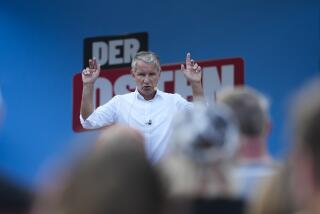West Germany’s Top Opposition Figure Stabbed
- Share via
COLOGNE, West Germany — The opposition’s candidate for chancellor, Oskar Lafontaine, was seriously wounded Wednesday night when a woman calmly handed him a bouquet of flowers and then slashed his throat with a butcher knife before hundreds of his stunned supporters at a campaign rally here.
The attacker was immediately overpowered by bystanders and taken into custody by police.
A police spokesman later identified the woman as Adelheid Streidel, 42, a doctor’s assistant from the town of Bad Neuenahr, about 40 miles south of here. The motive was unknown, and police declined to commment further until she had been interrogated.
Lafontaine, who last month was named by the Social Democrats to be their candidate for chancellor in next December’s general election, was described as in serious but stable condition after a 1 1/2-hour operation at the University Clinic in Cologne.
“We believe that, after the operation, the worst danger is over and we hope that there is no permanent damage,” said Dr. Heinz Pichelmeier, who led the surgical team. “But we must in any case wait until tomorrow to judge conclusively.”
Earlier, doctors said the woman’s knife had apparently severed a vein and that he had lost much blood.
The attack occurred at a political rally in the city’s working-class suburb of Muelheim. Lafontaine was standing on the stage with another leading Social Democrat, the premier of North Rhine-Westphalia state, Johannes Rau, who had just completed a campaign speech to a crowd of about 1,500.
According to witnesses and police officials, the attacker was led onto the stage by a man who appeared to be a party security functionary. She was led past police who were deployed both in front of the stage and on the steps leading to it, the witnesses said.
The woman, carrying an autograph book as well as her flowers, asked Lafontaine for his autograph. As the 46-year-old politician began to write, she pulled out an 11.8-inch, double-edged knife and struck at his neck, Cologne police officials said.
Lafontaine screamed, and West German television news footage showed him collapsing to the floor as aides crowded around and the woman was seized.
The woman, in the grip of party officials, stared almost serenely into the cameras as pandemonium erupted around her. Voices in the crowd screamed, “Who are you! Tell me your name! Say your name!”
She mumbled a refusal to answer, then smiled nervously as police led her away.
Lafontaine, who is also the party’s deputy leader and premier of the Saarland state, was making one of 11 planned appearances in connection with the North Rhine-Westphalia state election scheduled for next month.
Social Democratic Party leader Hans-Jochen Vogel said he felt anger and pain at hearing of the attack.
“The causes and details of the attack are still unclear, but at this moment we feel ourselves closely bound with Oskar Lafontaine,” he told reporters at the hospital entrance.
In Paris, Chancellor Helmut Kohl called the attack inhuman and said the assailant should be severely judged.
Last January, Lafontaine was reelected as premier of the Saarland, a victory that seemed at the time to send his career to new heights and the brink of national power.
Shortly after that victory, the Times of London began a full-page profile of him: “By this time next year, a poor boy from Saarlouis could, at the early age of 47, be chancellor of the richest country in Europe. He stands on the threshold of greatness--and he knows it.”
In winning that election, Lafontaine was the first nationally known politician to detect and capitalize on the backlash in West Germany against the flow of refugees from East Germany. He broke new ground by demanding a halt to refugee benefits, a measure later agreed to by Kohl’s government.
However, within weeks of that victory, he found himself on the wrong side of the German unity issue, urging a go-slow approach when the public mood in both Germanys wanted rapid reunification. He has not been able to recover from that setback and, after the Social Democrats’ sister party in East Germany received a drubbing in the March 18 elections there, he has trailed Kohl in West German public opinion polls.
Lafontaine rose to national prominence in 1985 as the bright, clever, new face of the Social Democrats.
Initially a voice so far to the party’s left that some dubbed him “Oskar the Red,” he later altered his positions more toward the political center, a move that opened him to criticism as an opportunist.
A populist, Lafontaine is also one of the party’s most important original thinkers, co-opting the environmental movement in his home state and pushing through a major new party policy last year that called for zero-growth and an ecological overhaul of the German economy.
His support for the Atlantic Alliance has always been less than enthusiastic, and U.S. officials have fretted privately about Germany’s role in the alliance should he become chancellor.
However, he presented a party policy document earlier Wednesday that advocated temporary North Atlantic Treaty Organization membership for a united German until a new security framework for Europe is developed.
Jones reported from Cologne and Marshall from West Berlin.
More to Read
Sign up for Essential California
The most important California stories and recommendations in your inbox every morning.
You may occasionally receive promotional content from the Los Angeles Times.













